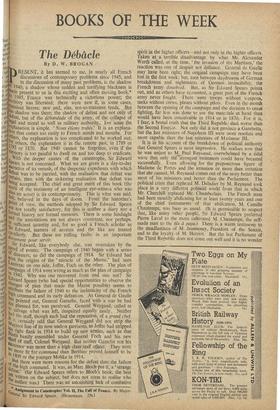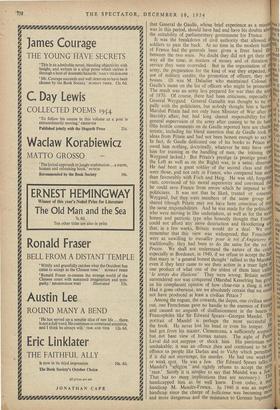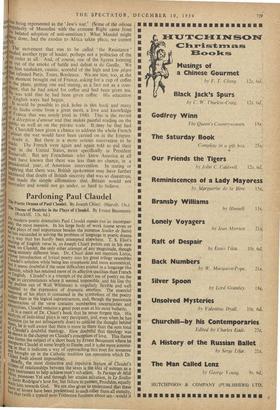BOOKS OF THE WEEK
The Debacle
By D. W. BROGAN RESENT, it has seemed to me. in nearly all French discussions of contemporary problems since 1945, and in the discussion of many past problems, is the shadow 1940, a shadow whose sudden and terrifying blackness is de present to us in this exciting and often moving book.* 1945, France was technically a victorious power; the eritory was liberated; there were new if, in some cases, lent heroes; new and, alas, not-so-transient feuds. But shadow was there; the shadow of defeat and not only of feat, but of the debandade of the army, of the collapse of PI and moral as well as military authority. For some the ,Planation is simple. ' Nous etions trahis.' It is an explana- '1un that comes too easily to French minds and mouths. For ?titers. the explanation is too complicated to be worked out; ,(31' others, the explanation is in the remote past, in 1789 or 793 or 1870. But 1940 cannot be forgotten, even if the Illentory is too painful to dwell on and too deep to eradicate. „ With the deeper causes of the catastrophe, Sir Edward Pears is not concerned. What we are given is a day-to-day tl.arrative of its onrush, of the desperate expedients with which ueleat was to be parried, with the realisation that defeat was ertain, then with the sickening realisation that defeat was Qeills accepted. The chief and great merit of this book (the th,erir of the testimony of an intelligent eye-witness who was .Iss) an actor) is its contemporaneity. This is what was said. 'eh, believed in the days of doom. From the historian's Pclint of view, the methods adopted by Sir Edward Spears re not totally satisfactory, for this is neither a diary nor a nItal history nor formal memoirs. There is some hindsight 'Out the annotations are not always consistent, nor perhaps, "I sufficient quantity and, for so good a French scholar as Sir Edward, matters of accents and the like are treated e,avalierly. Put these are trifling faults in an important rt)ctiinent pour servir. , Sir Edward, like everybody else, was overtaken by the !Peed of events. The campaign of 1940 began with a series disasters; so did the campaign of 1914. Sir Edward had 'een the origins of the miracle of the Marne,' had seen Lanrezac on one side, loffre, Foch on the other. The plan of amPaign of 1914 went wrong as much as the plan of campaign 1940. Why was one recovered from and one not? Sir 9ward Spears (who had special opportunities to observe the 2.1anges of plan that made the Marne possible) seems to :ittribute the failure of 1940 to the inelasticity of the French 114811 command and its early defeatism. As General de Gaulle as Pointed out, General Gamelin. faced with a war he had to Planned for, was paralysed. General Weygand, called in h salvage what was left, despaired equally easily. Neither '11,0 the stuff, though each had the reputation, of a grand chef. Llt; certainly odd that General Weygand did not strip the i','kginot lino of its now useless garrisons, as Joffrc had stripped light flank in 1914 to build up new armies, such as that v+lnth hastily assembled under General Foch and his new :jet of staff, Colonel Weygand. But neither Gamclin nor his ecessor was more than a high class staff officer. They were i:,111„, ore fit for command than Berthier proved himself to be 009 or the younger Moltke in 1914. 0,.'311t there were more reasons for the defeat than the failure the high command. It was, as Marc Bloch put it, a 'strange yeeireat.' (Sir Edward Spears refers to Bloch's book, the best thl; Written on the subject. but does not scent to realise who ..„...aythor was.) There was an astonishing lack of combative spirit in the higher officers—and not only in the higher officers. Taken at a terrible disadvantage by what Mr. Alexander Werth called, at the time, the invasion of the Martians,' the reaction was one of despair not defiance. General de Gaulle may have been right; the original campaign may have been lost in tho first week; but, torn between daydreams of German breakdowns and nightmares of German invincibility, the French army dissolved. But, as Sir Ed ,vard Spears points out, and as others haKe reaninted, a great part of the French, army never fought. There were troops without weapons. tanks without crews, Planes without pilots. Even in the month between the opening of the campaign and the decision to cease fighting, far less was done to use the mate,ials at hand than would have been conceivable in 1914 or in 1870. For it is. I fear, a brutal truth that the Third Republic died worse than the Second Empe. Not only did it not produce a Gambetta, but the last ministers of-Napoleon lB were more resolute and more capable than the last ministers of M.trianne It is in his ac.:ount of the breakdown of political authority that General Spears is most impressive. He realises now that he was unjust to M. Paul -Reynaud, overwhelmed by a tidal wave that only the strongest Swimmers could have breasted successfully. Even allowing for the preposterous figure of Madame de Portes and the irritation or more than irritation that she caused, M. Reynaud comes out of the story better than most of his ministers and better than the Parliament. The political crisis that replaced M. Daladier by M. Reynaud took place in a very different political world from that in which Mr. Churchill replaced Mr. Chamberlain. The French state had been steadily abdicating for at least twenty years and one of the chief instruments of that abdication, M. Camille Chautemps, was busy as usual. (It is permissible to suspect that, like many other people, Eir Edward Spears preferred Pierre Laval to the more cultivated M. Chautemps, the self- made man to the fils it papa.) There is a Warm testimony to the steadfastness of M. Jeanneney, President of the Senate, and to the loyalty of M. Herriot. But the last Parliament of the Third Republic does not come out well and it is no wonder that General de Gaulle, whose brief experience as a minist was in this period, should have had and have his doubts abo the suitability of parliamentary government for France. It was the breakdown of civil authority that allowed t soldiers to pass the buck. At no time in the modern histo of France had the generals been given a freer hand Oa between the two wars. No doubt they did not get their ow way all the time; in matters of money and of duration service they were overruled. But in the organisation of t army, the preparation for the kind of war they expected, t use of military credits, the promotion of officers, they We, bosses. (It was M. Daladier who maintained Colonel a Gaulle's name on the list of officers who might be promote The result was an army less prepared for war than the a of 1870. Of course, there had been criticisms, especially General Weygancl. General Gamelin was thought to be 1 pally with the politicians, but nobody thought him a Serra Marshal Main had not only been Minister of War after Stavisky affair, but had long shared responsibility for ti general supervision of the army after ceasing to be its flea°. (His hostile comments on de Gaulle reported here are chats,, teristic, including his bland assertion that de Gaulle took 10 ideas from Main and had not been honest enough to say 0, In fact, de Gaulle dedicated one of his books to Main 0, owed him nothing, doctrinally, whatever he may have owe° him for training in the handling of men, the training thal, Weygand lacked.) But Petain's prestige (a prestige great 01 the Left as well as on the Right) was, in a sense, deserve°. He had been a great soldier of the' second class and tItell were those, and not only in France, who compared him inoto 16s. than favourably with Foch and Haig. He was old, forgetful: vain, convinced of his moral superiority and convinced till' he could save France from errors which he imputed to 01 politicians. It was not that he liked, trusted or esteeindo Weygand, but they were members of the same group an i shared (though Petain may not have been conscious of tht the same responsibilities. And he skas made for the politici4. who were moving in like undertakers, as well as for the met honest and patriotic type who honestly thought that Franc°, could not afford any more destruction and bloodletting az' that, in a few weeks, Britain would do a deal. We Ind remember that this view was widespread, that Frenebine° were as unwilling to travailler pour le roi . d' A ngleterre 11!' traditionally, they had been to do the same for the roi 1,11 Prusse. We shall not understand the nature of the cris1s. especially at Bordeaux, in 1940, if we refuse to accept the PI that many in 'a general honest thought' rallied to the Marsh' even if they later came to see their action in a truer light oil one product of what one of the ablest of them later calk" 'le temps des illusions.' They were wrong; Britain neithe surrendered nor was conquered (Marshal Kesselring has givell us his complacent opinion of how close-run a thing it wal Had it gone otherwise, are we absolutely certain that we coat not have produced at least a civilian Main 7 Among the rogues, the cowards, the dupes, one civilian stood out, one Frenchman gave no handle to the enemies of Frani and caused no anguish of disillusionment in the hearts I7 Francophiles like Sir Edward Spears--Georges Mandel. 1111 portrait of Mandel is perhaps the most successfulIP the book. He never lost his head or even his temper. ,111 had got from his master, Clemenceau, a sufficiently sceptIca, but not base view of human nature. The sight of Pier", Laval did not surprise or shock him. His patriotism W0' unshakable; it was an offence ,then and continued to be aldi offence to people like Darlan and to Vichy which permitte : if it did not encourage, his murder. He had one weaknes, or weak spot. He was a Jew. (Sir Edward Spears talks Mandel's ` religion' and rightly refuses to accept the 'race.' Surely it is simpler to say that Mandel was a /el% That has no more implications than are necessary.) TI'l, handicapped him as he well knew. Even today, it handicap M. Mendes-France. In 1940 it was an espec°,,, handicap since the charge of bellicisme was becoming WI: and more dangerous and the resistance to German hegenton' "ave done, had the exodus to Africa taken place, we cannot The movement that was to be called 'the Resistance' • 14 needed another type of leader, perhaps not a politician Of the • /ES co ■o• lew. mr. °Id order at all. And, of course, one of the figures looming • P Out of the smoke of battle and defeat is de Gaulle. We • Musings of geC him unshaken, caustic. scornful of the high and low pegrea a Chinese Gourmet tihat infested Paris, Tours, Bordeaux. We-see him, too, at the In the plane, getting one and stating, as a fact not as a corn- • Paint, that . he had asked for coffee and had been given tea. • Black Jack's Spurs . e was told that he had been given coffee. . His education It would be possible to pick holes in this book and many •
1
i is faults come from a great merit, a love and knowledge • Of France that was sorely tried in 1940. This is the record • Godfrey Winn Public as well as on the private scale. It may be that had • The Queen's Countrywomen. ,Tr. Churchill been given a chance to_ address the whole French ,:abinet the war would have been carried on in the Empire. • The Saturday Book tittst . in the United States, more specifically in President • • oesevelt. But any Frenchman who knew America at all Our Friends the Tigers must have known that there was less than no chance, in a a 1 Ill surrender and would not go under, so hard to believe. •










































 Previous page
Previous page